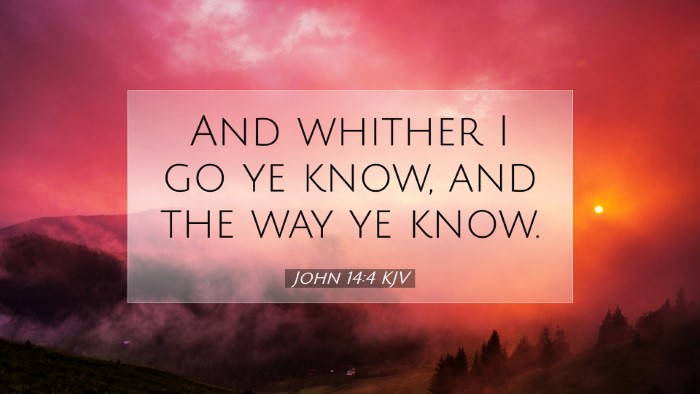Bible Commentary on John 14:4
Verse: John 14:4 - "And whither I go ye know, and the way ye know."
Introduction
This passage occurs during the Last Supper, where Jesus prepares His disciples for His impending departure. Jesus speaks of His future, indicating that His followers are not left in uncertainty about their own journey.
Insights from various public domain commentaries highlight the profound theological implications of this verse as it pertains to knowledge, guidance, and the nature of Christ's mission.
The Context of Assurance
Matthew Henry draws attention to the frame of mind within which this declaration was made. The disciples were troubled by the news of Jesus’ impending departure. Here, He reassures them that they possess the necessary understanding and guidance for their journey ahead.
Albert Barnes emphasizes that Jesus refers to His knowledge and intention regarding His destination, suggesting that His movement was both purposeful and significant. This implies that believers, too, can have confidence in their path due to Christ’s guidance.
Understanding 'Whither I Go'
Adam Clarke points out that the phrase "whither I go" refers to the profound spiritual truth of Christ ascending to the Father. Jesus' reference to His destination carries with it an affirmation of His divine nature and the reality that He leads believers towards eternal life.
The 'whither' denotes not simply a physical journey but an invitation into understanding the nature of God’s kingdom and dwelling place. Hence, it bears implications for eschatology and resurrection hope.
Knowledge and the Way
The second part of the verse, "and the way ye know," implies that Jesus provides clarity in a world filled with confusion. According to Matthew Henry, the 'way' symbolizes Christ Himself as the exclusive pathway to salvation, an idea echoed throughout the Gospel of John.
Albert Barnes affirms this interpretation, stating that Jesus embodies the way to the Father, effectively becoming the road upon which believers must walk. This reinforces the central Christian doctrinal tenet that relationship with Christ is essential to understanding our spiritual journey.
Theological Implications
This verse encapsulates key theological themes such as revelation, guidance, and Christology. The knowledge of God's plan and the way to access it emphasizes the gift of revelation given to the believers.
Adam Clarke reflects on the implications of this insight, noting that knowing the way reinforces the responsibility of believers to seek Christ as the source of truth. It urges the recognition that understanding is not just intellectual acknowledgment but a transformative relationship with Jesus.
Pastoral Reflections
For pastors, this verse serves as a powerful reminder to guide congregations toward assurance in their faith journey. In times of uncertainty, this scripture encourages believers to trust in Christ as the definitive way forward, offering both direction and hope.
Sharing the context of this teaching can bolster confidence in times of trial, making it pivotal for pastoral care and preaching.
Application for Students and Theologians
For biblical scholars and students, John 14:4 invites deeper studies into the Johannine theology, particularly the implications of Jesus as the 'Way.' The way in which He articulates knowledge and the journey facilitates discussions around discipleship, the nature of faith, and the transformative power of divine revelation.
Engaging with public domain commentaries such as those of Matthew Henry, Albert Barnes, and Adam Clarke allows for a rich understanding of the text and its applications in contemporary theological discourse.
Conclusion
John 14:4 offers profound insights into the nature of Christ and His relationship to believers. By affirming that they know where He is going and how to get there, Jesus emphasizes the significance of faith that is rooted in knowledge and relationship. Therefore, this scripture serves as a critical point of meditation for anyone pursuing a deeper knowledge of God’s Word.


